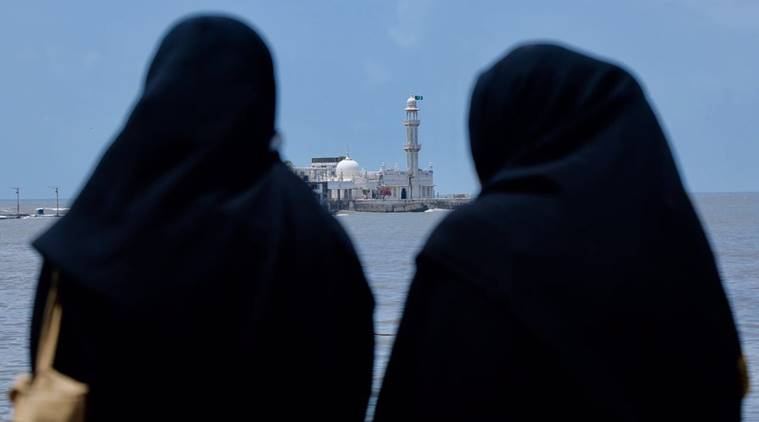
The Supreme Court Tuesday issued notice to the Centre, All India Muslim Personal Law Board and National Commission for Women among others on a petition by a Pune couple who sought directions to let Muslim women enter mosques and offer prayers.
The bench of Justices S A Bobde and S Abdul Nazeer did not seem very convinced by the submission of the petitioners who also cited the Supreme Court order in the Sabarimala case. The bench said it was hearing the plea only “because of the judgment in Sabarimala”.
Last September, a five-judge Constitution Bench lifted age restrictions on the entry of women to the Sabarimala temple. Review petitions were filed against the order and the court, after hearing parties to the matter, reserved its verdict.
Read | Read in Quran that women can pray in mosques: Couple who filed SC plea
“The only reason we are hearing you is because of the judgment in Sabarimala. Otherwise we don’t think you are giving satisfactory answers,” the bench told advocate Ashutosh Dubey who appeared for petitioners Yasmeen Zuber Ahmad Peerzade and her husband Zuber Ahmad Nazir Ahmad Peerzade.
The petition recalled the Sabarimala order in which the court said “religion cannot be used as cover to deny rights of worship to women and it is also against human dignity. Prohibition on women is due to non-religious reasons and it is a grim shadow of discrimination going on for centuries”.
The bench asked the counsel which other mosques in the world allow entry to women. Mecca, replied the lawyer. At this, Justice Nazeer said: “I don’t think they have a common congregation.”
Justice Bobde told the counsel: “Another thing we want you to tell us is can the fundamental right to equality be asserted against another human being?… Article 14 begins with State should not deny. Does that apply to an individual?… Can you invoke Article 14 and demand equality from another human being or from non-state actors?”.
The counsel replied in the affirmative.
To this, Justice Bobde said “looks like you are reading a different Article 14 than the one we know”, adding “Is a mosque a State? Is a temple a State? Is a church a State?… If you do not want someone to enter your house, can that person enter with police protection… Where is the State involved in this?”
Dubey said the mosque receives grants from the State and as such cannot deny entry to a certain class.
The petition contended that “there is nothing in the Quran and the Hadith that requires gender segregation” and “the act of prohibition of females from entering mosque is void and unconstitutional as such practices are not only repugnant to the basic dignity of a woman as an individual but also violative of the fundamental rights guaranteed under Articles 14, 15, 21 and 25 of the Constitution”.
The petitioners said several women were affected by this but were not in a position to approach the court. They said there were no records stating that the Holy Quran and the Prophet had opposed women entering mosques and offering prayers.
“At present, women are allowed to offer prayers at mosques under Jamaat-e-Islami and Mujahid denominations, while they are barred from mosques under the predominant Sunni faction. It is submitted that even in the mosques where women are allowed, there are separate entrances and enclosures for worship for men and women… It is submitted that there is no such gender discrimination to offer worship in Mecca, the holy city. The faithful, both men and women, together circle the Kaaba,” the petition stated.
“Muslim women are being ‘discriminated’ as they are not allowed to enter and pray in the main prayer hall of mosques in violation of Articles 14 and 21 of the Constitution” and “this is an encroachment into the realm of personal liberty and social security,” it stated.
The petition said “the legislature has failed to ensure the basic dignity and equality of women in general and Muslim women in particular when it concerns matters related to entry in mosque, wearing burqa”.